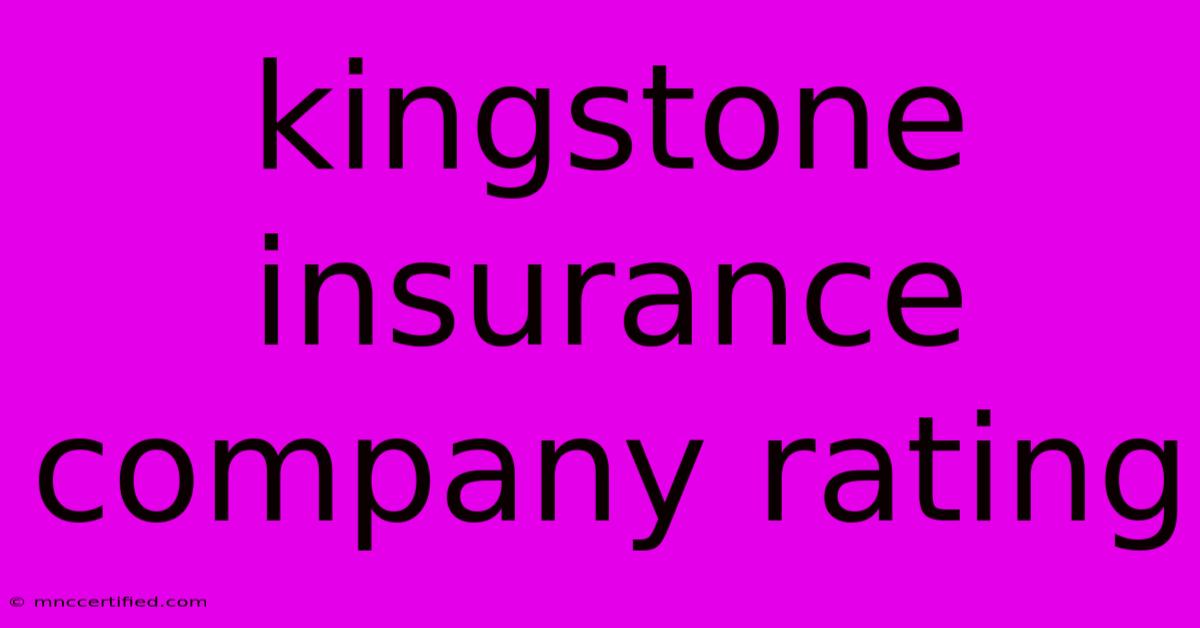Kingstone Insurance Company Rating

Table of Contents
Kingston Insurance Company Rating: A Comprehensive Guide
Finding reliable insurance is crucial, and understanding a company's financial strength is key. This guide delves into Kingston Insurance Company ratings, exploring how these ratings are determined, where to find them, and what they mean for you as a potential customer. We'll also touch upon the importance of comparing ratings across different providers.
Understanding Insurance Company Ratings
Insurance company ratings are assessments of a company's financial stability and ability to pay claims. These ratings are issued by independent rating agencies, which analyze various financial factors to determine the likelihood of an insurer meeting its obligations. A high rating generally signifies a financially strong and reliable company, while a low rating raises concerns about the insurer's ability to pay claims. These ratings are not endorsements but valuable tools for informed decision-making.
Key Factors Considered in Ratings
Rating agencies consider numerous factors when assessing an insurance company, including:
- Reserves: The amount of money an insurer sets aside to pay future claims. Adequate reserves are critical for a strong rating.
- Underwriting Performance: How effectively the company assesses and manages risk. Consistent profitability suggests strong underwriting.
- Investment Portfolio: The performance of the company's investments significantly impacts its financial health.
- Management Quality: Experienced and competent management is essential for sound financial practices.
- Capitalization: The amount of capital available to the company, acting as a buffer against losses.
Where to Find Kingston Insurance Company Ratings
Unfortunately, I cannot provide specific ratings for "Kingston Insurance Company" as this may not be a real, widely known insurance provider. The name might be localized, a subsidiary, or a misspelling. To find the rating for your specific insurance company, follow these steps:
- Identify the correct company name: Double-check the spelling and ensure you have the full legal name.
- Check major rating agencies: The most reputable rating agencies include A.M. Best, Moody's, Standard & Poor's (S&P), and Fitch. Visit their websites directly and search for the insurance company's name.
- Look for financial reports: Companies often publish annual reports or financial statements that may include rating information.
Deciphering Insurance Company Ratings: What the Numbers Mean
Rating scales vary slightly between agencies, but generally, a higher rating indicates greater financial strength. Ratings often use letter grades (e.g., A++, A+, A, B++, etc.) or numerical scores. A high rating, such as A++ or AAA, suggests exceptional financial strength, while a lower rating might indicate potential financial instability.
It's crucial to understand that even a highly-rated company might not be the perfect fit for your needs. Always compare quotes, coverage options, and customer service before selecting an insurer.
The Importance of Comparing Ratings
Don't rely on a single rating. Compare ratings from multiple agencies to get a more comprehensive picture of an insurance company's financial health. Different agencies may use slightly different methodologies, resulting in varying ratings for the same company.
Beyond the Numbers: Other Factors to Consider
While ratings are essential, they shouldn't be the sole factor in your decision. Consider these additional factors:
- Customer service: Read online reviews and check customer satisfaction ratings.
- Claims process: Investigate how easy it is to file and process claims with the company.
- Policy coverage: Carefully review the policy details to ensure it meets your needs.
- Price: Compare prices from different companies with similar ratings and coverage.
By understanding how to find and interpret insurance company ratings and by considering other important factors, you can make an informed decision about your insurance needs. Remember to always perform thorough research before choosing an insurance provider.

Thank you for visiting our website wich cover about Kingstone Insurance Company Rating. We hope the information provided has been useful to you. Feel free to contact us if you have any questions or need further assistance. See you next time and dont miss to bookmark.
Featured Posts
-
Great Florida Insurance Indiantown
Nov 17, 2024
-
Ronaldo Retirement Hints At Date
Nov 17, 2024
-
Sabrina Christinas La Concert Surprise
Nov 17, 2024
-
Classic British Film Hugh Grant
Nov 17, 2024
-
Travis Hunter Heisman Tracker Update
Nov 17, 2024